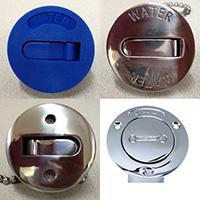That won't work, Claude...at least not for long. The following is from Vic Willman, who has retired from Raritan after 40 years, the last 20 in tech support...and my guru for all those 20 years:
Water heaters 101
If you put two metals together in water, one will corrode to protect the other. Which metal is which is determined by where they are on the galvanic scale. Most plumbers (but not necessarily most boat owners) know better than to screw a steel fitting into a copper fitting because the steel will immediately start to rust. It is less “noble” than copper. The metal being protected is the cathode. The metal being consumed is the anode. The anode protects all the other metal in a water heater...and removing it won't just shorten the life of a water heater, it'll cut the life of a water heater in half...which is why every domestic water heater mfr specifically states that removing the anode voids the warranty.
Anodes are included in the water heaters that have glass-lined steel tanks to protect the inside of the tank against corrosion from acids in the water, stray electrical currents, etc. Glass lined tanks, when the water heater is being built, are heated up red hot. Then glass powder is sprayed inside the tank and it adheres upon contact. However, it doesn't cover every single crack and crevice inside the tank - it should, but in actual practice, it doesn't. The purpose of the anode is to protect those spots inside the tank that have not been glass-covered from rusting away prematurely. The anode is eaten away, rather than the tank being eaten away. Kind of a backup to the glass lining.
The anode is a magnesium rod, about 3/4" in diameter that is attached to the inside of the hot water "out" nipple, via a plastic coupling. It is electrically isolated from the fittings and from the tank. It extends all the way across the inside of the tank, stopping just short of the other side. There is an iron rod in the center of the magnesium that supports it, the iron being stronger than the magnesium. As the magnesium is eaten away and the iron rod exposed, there's a chemical reaction between the water, the iron and the magnesium that causes the "rotten egg" smell. Replacing the anode and flushing out the tank will usually make the foul smell go away.
The least expensive marine water heaters don't have replaceable anodes...instead of glass lined tanks, they have anodized steel or even aluminum tanks...when the anodizing wears off the tank walls, the only cure is a new water heater. But ALL water heaters, domestic and marine have anodes of some kind.
Peggie
"If you can't explain it to a six year old, you don't completely understand it yourself." --Albert Einstein


